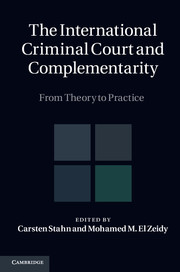Book contents
- Frontmatter
- Contents
- Acknowledgments
- Foreword by HE Judge Sang-Hyun Song
- Foreword by Patricia O’Brien
- Foreword by Silvia A. Fernandez de Gurmendi
- List of abbreviations
- Introduction: bridge over troubled waters?
- PART I General reflections
- PART II Origin and genesis of complementarity
- PART III Analytical dimensions of complementarity
- 7 Complementarity as global governance
- 8 Policy through complementarity: the atrocity trial as justice
- 9 Taking complementarity seriously
- 10 International criminal justice in the era of failed states: the ICC and the self-referral debate
- 11 The quest for constructive complementarity
- 12 Reframing positive complementarity
- 13 Too much of a good thing?: implementation and the uses of complementarity
- PART IV Interpretation and application
- PART IV (Continued) Interpretation and application
- PART V Complementarity in perspective
- PART VI Complementarity in practice
- Index
- References
9 - Taking complementarity seriously
On the sense and sensibility of ‘classical’, ‘positive’ and ‘negative’ complementarity
from PART III - Analytical dimensions of complementarity
Published online by Cambridge University Press: 05 November 2014
- Frontmatter
- Contents
- Acknowledgments
- Foreword by HE Judge Sang-Hyun Song
- Foreword by Patricia O’Brien
- Foreword by Silvia A. Fernandez de Gurmendi
- List of abbreviations
- Introduction: bridge over troubled waters?
- PART I General reflections
- PART II Origin and genesis of complementarity
- PART III Analytical dimensions of complementarity
- 7 Complementarity as global governance
- 8 Policy through complementarity: the atrocity trial as justice
- 9 Taking complementarity seriously
- 10 International criminal justice in the era of failed states: the ICC and the self-referral debate
- 11 The quest for constructive complementarity
- 12 Reframing positive complementarity
- 13 Too much of a good thing?: implementation and the uses of complementarity
- PART IV Interpretation and application
- PART IV (Continued) Interpretation and application
- PART V Complementarity in perspective
- PART VI Complementarity in practice
- Index
- References
Summary
Complementarity has many faces. Today, it is traditionally theorized on the basis of a distinction between ‘classical’ and ‘positive complementarity’. This chapter revisits this categorization. It argues that both conceptions are inherent in the framework of the Rome Statute, but underdeveloped in their articulation and meaning due to the framing of Article 17. Both concepts are often misunderstood or used in order to justify specific policy choices. This chapter argues that forum allocation is governed by three cardinal principles which underpin the functioning of the Rome system of justice: (i) effectivenes, (ii) impartiality and (iii) fairness. It defines means and methods of ‘classical’ complementarity, including its use as a carrot and stick. It challenges the assumption that ‘positive’ complementarity is merely a policy principle or a tool to strengthen domestic jurisdiction. It argues that the ICC is empowered to use techniques to overcome ‘inability’ and ‘unwillingness’ as part of its mandate. It claims that the move from a passive to a managerial understanding of complementarity requires greater attention to the foundational goals of the Court, i.e. judicial independence, effective justice, fairness and sustainability.
Introduction
The concept of complementarity has undergone significant transformation in international criminal justice. In the ad hoc tribunals, the virtue of complementarity was largely revealed as a byproduct of judicial activity. It is inherent in the referral mechanism under Rule 11bis which was introduced as part of the completion strategy. In this context, i.e. the process of transfer of cases to national jurisdictions, complementarity has become a ‘main priority’ for the tribunals. Under the Rome Statute, complementarity is not only a technical concept, but a systemic feature of the International Criminal Court (ICC). It marks the very foundation of a new system of justice. Its potential to create a broader culture of accountability and prevention of mass atrocity crimes constitutes one of the prerequisites for the long-term impact and success of the ICC.
- Type
- Chapter
- Information
- The International Criminal Court and ComplementarityFrom Theory to Practice, pp. 233 - 282Publisher: Cambridge University PressPrint publication year: 2011
References
- 4
- Cited by



